Arts & Culture Newsletter: For musician Michael Tiernan, the show must go on
Good morning, and welcome to the U-T Arts & Culture Newsletter.
I’m David L. Coddon, and here’s your guide to all things essential in San Diego’s arts and culture this week.
Singer-songwriter Michael Tiernan modestly calls it “one of the lesser known, longest-running showcases in San Diego.” Fans of this local musician, however, have known about Tiernan’s “Acoustic Wednesdays” showcase since he began hosting it “many moons ago, back in 2006 or 2007” at En Fuego Cantina & Grill in Del Mar.
Every Wednesday, Tiernan would preside over an evening of music, performing and presenting other area artists to audiences.
“It became kind of my office,” Tiernan recalled. “My listeners always knew I was there.”
“Acoustic Wednesdays” was briefly interrupted last March when California went into its initial COVID shutdown. But not for long. Tiernan pivoted to a virtual presentation of “Acoustic Wednesdays,” which can be heard on his Facebook Live page.
“I try to connect with people,” Tiernan said, “and to keep my chops up. And finding a new audience has been good.”
Tiernan’s last onstage performance was March 4, 2020, at the Belly Up. Like musicians everywhere, Tiernan has spent the past 10 months not only reinventing his business model to adjust to a world without live gigs, but turning to his art for inspiration and peace of mind.
“Music is my way of processing everything going on around me and inside of me,” he said. “It’s my best friend.” The pandemic “forced me to go inside and find songs that help me and listeners along.”
His switch to virtual performances, as with “Acoustic Wednesdays,” has proved a benefit.
“I found right away,” he said, “that it gave me an intimacy to bare my soul a little differently. It reminded me of a confessional. The webcam has been that for me.”
Theater
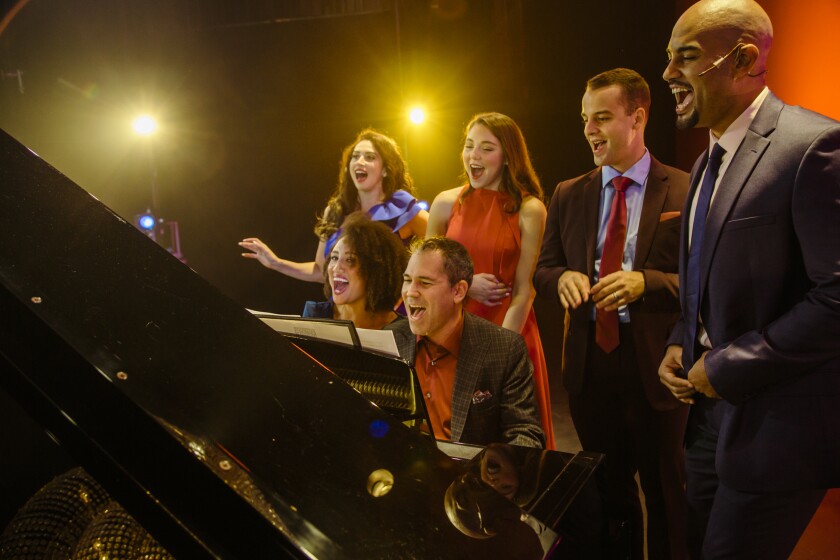
Lesli Margherita, Andrea Ross, Ryan Vona, Nicholas Christopher, Ashley Blanchet and Andy Einhorn in “You I Like: A Musical Celebration of Jerry Herman.”
(Photo by Jeff Lorch)
Pasadena Playhouse’s streaming production “You I Like: A Musical Celebration of Jerry Herman” is a melodic love letter to the late American composer whose biggest Broadway hits were “Hello, Dolly!”, “Mame” and “La Cage aux Folles.”
At the outset of this 84-minute show, musical director and host Andy Einhorn, who also accompanies its performers on piano, hails Herman as “the defining master of the showtune.” So begins a nearly-30-song cavalcade of Herman songs rendered by a diverse, enthusiastic ensemble. Though recorded inside the empty Pasadena Playhouse, everyone involved sings as if to the very back row, which seems a bit over the top.
Herman devotees will recognize more of the numbers than did I, who am familiar for the most part with the scores of “Dolly” and “Mame” and “La Cage.” Other Herman shows featured in “You I Like” include 1961’s “Milk and Honey,” “Dear World” from 1969 and ‘74’s “Mack and Mabel.” A pet peeve of mine: some of the songs are grouped together in medleys and therefore sung only in part, including a segment paying tribute to Herman’s “title tunes,” such as “Mame’s.”
From behind his piano, Einhorn intervenes with biographical tidbits about Herman, such as the fact that amazingly he was not a trained musician. “You I Like” can be streamed for $24.99.
Visual art and film

“Waking the T-Rex: The Story of Sue”
(Courtesy photo)
Here’s a genuine bargain: For only 99 cents, you can stream one of the Field Museum of Chicago’s “Giant Screen Films.” These documentary rentals are companion pieces to exhibits at the museum itself, which reopened with safety restrictions on Jan. 23.
Everybody loves dinosaurs, right? So I sprang from among the films available for a rental of “Waking the T-Rex: The Story of Sue.” Sue is the T-Rex whose reassembled skeleton is on display at the Field Museum. “She” is named for one of the anthropologists who discovered the dino’s fossil remains. Some impressive dimensions: Sue, the T-Rex not the anthropologist, is over 40 feet long and 13 feet high, and weighs seven tons. (The skull alone weighs 600 pounds.)
The 26-minute film shifts between animatronic depictions of the T-Rex’s life in prehistoric days, flashbacks to the discovery of the fossils in the American Badlands in 1990 and footage of Field Museum scientists studying and eventually reassembling Sue after 67 million years. It’s all fascinating, though the animatronic dinos are not quite up to “Jurassic Park” quality, and kids may be squeamish (as was I) during sequences when the T-Rex is shown attacking and feasting on other giant reptiles.
Film
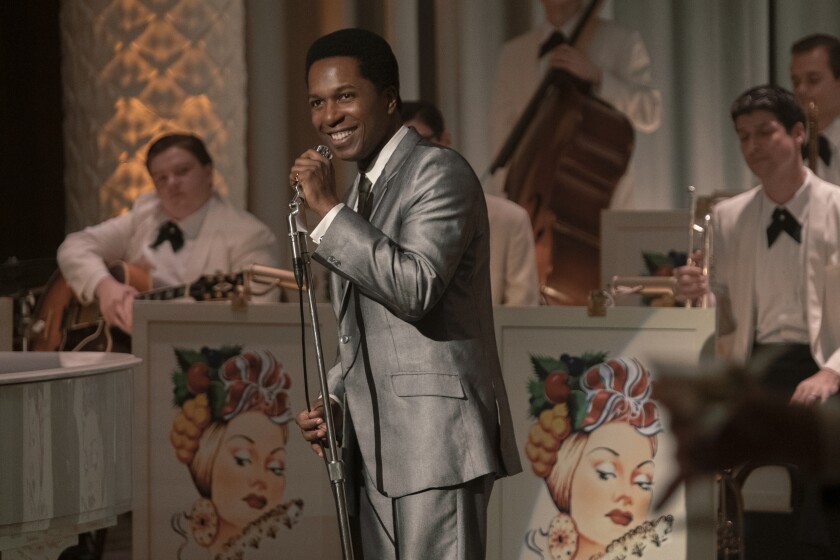
“Waking the T-Rex: The Story of Sue”
(Patti Perret/Amazon Studios)
What would it have been like if Malcolm X, football great Jim Brown, singer-songwriter Sam Cooke and Cassius Clay (before he became Muhammad Ali) hung out on the night the legendary boxer won the heavyweight title over Sonny Liston in Miami in 1964? That’s the “what if?” premise of “One Night in Miami,” a knockout film on Amazon Prime.
The movie is an adaptation of Kemp Powers’ play and is the feature-film directorial debut of Regina King. Though talky, as you would expect a filmed play to be, “One Night in Miami” is at once fiery and cerebral, and it features top-tier performances from Kingsley Ben-Adir in the chief role as Malcolm X, Eli Goree as Clay/Ali, Leslie Odom Jr. as Cooke and Aldis Hodge as Brown.
Among the dramatic conflicts that simmer over the course of 110 minutes are the new heavyweight champ’s intended conversion (driven by Malcolm X) to the Nation of Islam and, more volatile still, the civil rights activist’s charge that Cooke (“Cupid,” “Wonderful World”) is wasting the potential influence of his talent on a mainstream career. SPOILER ALERT: Cooke will answer with his powerful “A Change is Gonna Come.”
Arts
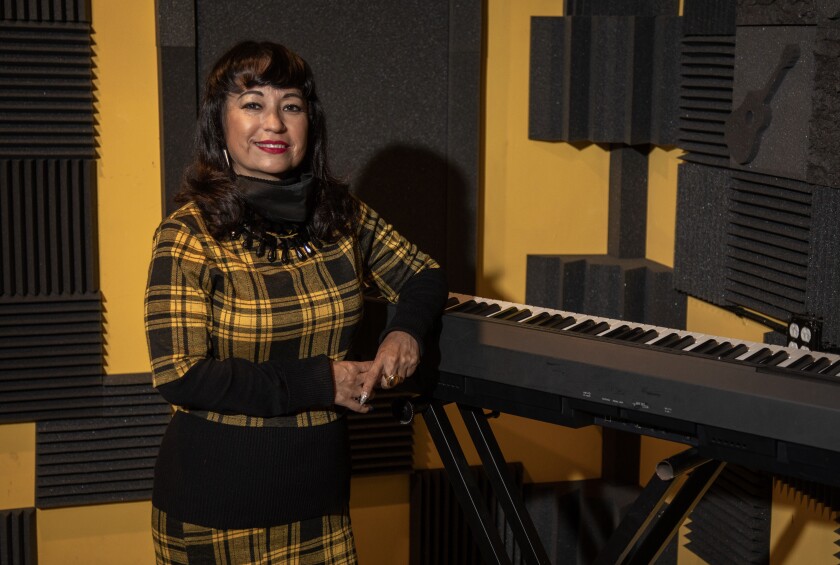
Owner Alma Rodriguez poses in the recording studio at Queen Bee’s Arts & Cultural Center in North Park
(Jarrod Valliere / The San Diego Union-Tribune)
Can Queen Bee’s Art & Cultural Center in North Park regain its buzz as a lively hive for music, poetry, dance, spoken-word and comedy events?
Or has the 13-year-old grassroots community center — shuttered since March because of the coronavirus pandemic and struggling to stay afloat — shut its doors forever?
Those questions are growing more pressing by the day for Alma Rodriguez, who founded Queen Bee’s as a labor of love, and for the many seasoned and aspiring San Diego artists who have found an inviting home there.
In February, some of those artists — including poet Rudy Francisco, comedian Walter Ford and jazz artists Charlie Arbelaez and Gilbert Castellanos — will perform a series of livestream benefit shows to help Rodriguez raise the $40,000 she needs to help the venue ride out the pandemic until at least summer. A GoFundMe crowdsourcing campaign was launched this week and, by late Friday afternoon, had raised $2,070.
Read more about Chan and Mainly Mozart in this story by the Union-Tribune’s George Varga.
Classical music
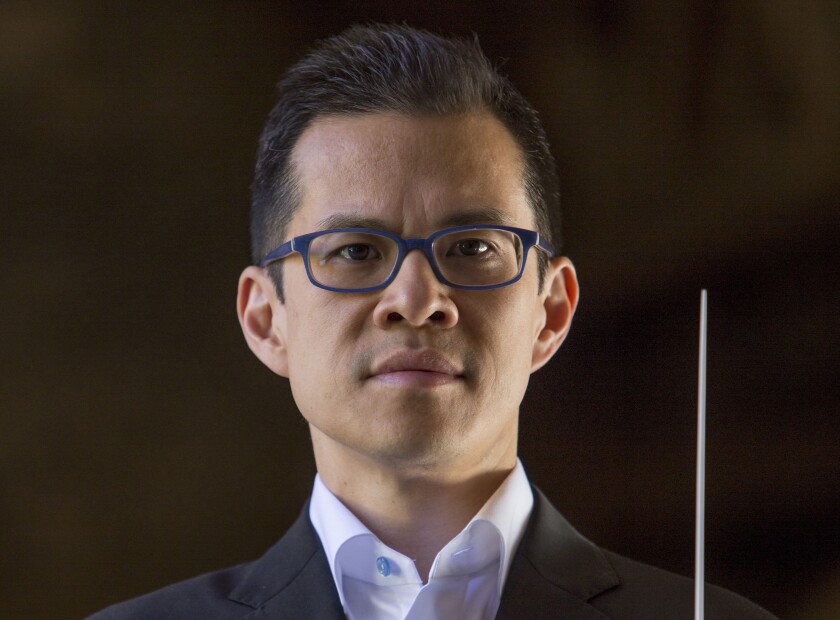
Violinist David Chan
(Courtesy)
For many of the nationally prominent classical musicians who traveled to San Diego last October for the Mainly Mozart Festival Orchestra drive-in concert series, it was a welcome if surreal experience to perform in the main parking lot of the Del Mar Fairgrounds as cars zipped by on the adjacent Interstate 5.
For David Chan, it was also a homecoming.
“I grew up in Del Mar, and my parents live there to this day,” said the violin virtuoso, who is the concertmaster for New York’s famed Metropolitan Opera Orchestra.
“It was amazing to play at the fairgrounds, a place I grew up going to in the summers for the rides, the cotton candy and the funnel cake! It brought back a lot of memories, and it was very meaningful, since San Diego is my hometown.”
Now 47, Chan is a graduate of La Jolla Country Day School, Harvard and The Juilliard School, where he earned his master’s in music in 1997 and currently teaches. He’ll wear several hats when he returns to San Diego in early February and April for the first two segments of Mainly Mozart’s three-part Festival of Orchestras, which will be held in a drive-in concert format at the Del Mar Fairgrounds.
Read more about Chan and Mainly Mozart in this story by the Union-Tribune’s George Varga.
Music
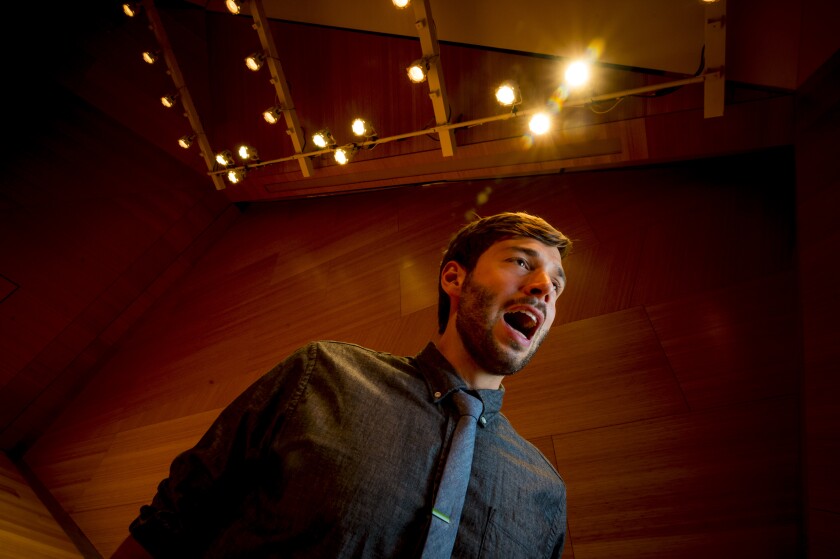
Baritone Jonathan Nussman says of his upcoming Project [Blank] concert: “After nearly a year of only interacting with other musicians over Zoom, it has been a revelatory, soul-enriching experience to return to in-person music.”
(Courtesy photo)
It certainly wasn’t Jonathan Nussman’s plan to graduate from UC San Diego during a pandemic. But that’s exactly what happened.
Last year, as the coronavirus pandemic shut down the arts world, the baritone received his Doctor of Musical Arts, a degree he completed after six years of hard work.
It wasn’t easy. He juggled school with work — performing as well as teaching music history classes and private voice lessons. Receiving his degree last summer was the finish line he’d long worked hard to cross. Then COVID-19 happened.
“I had a full season lined up through next year,” said the 36-year-old Nussman, a South Carolina native who moved to San Diego in 2014 to study contemporary music performance at UCSD. “Most of that has been canceled.”
On Friday and Sunday, he’s performing “O Mensch!” by the French composer Pascal Dusapin. The concert opens the 2021 season of San Diego-based Project [Blank], with interactive set and projections by Joshua Moreno and direction by mezzo-soprano Leslie Ann Leytham, who co-founded Project [Blank] in 2018 with pianist Brendan Nguyen.
Read more about Nussman and Project [Blank] in this story by the Union-Tribune’s Michael James Rocha.
Music, Part II
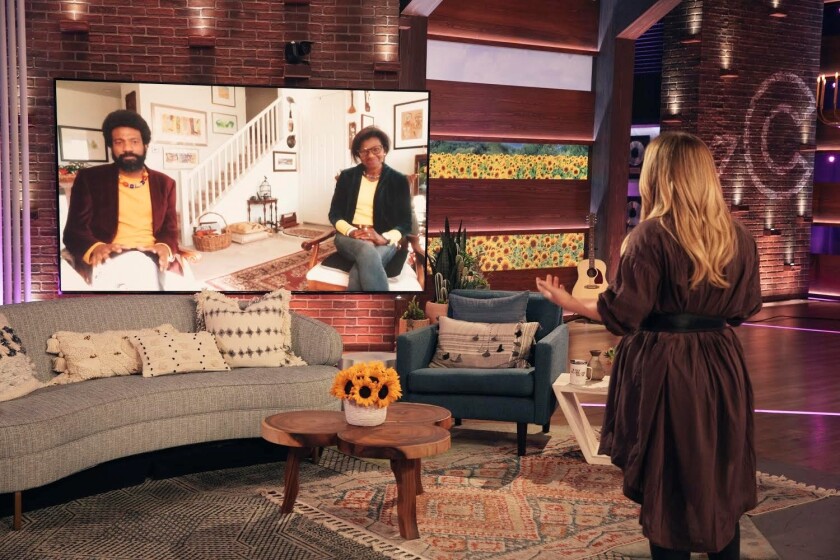
San Diego musician Alfred Howard and his mother, Marian, were featured on “The Kelly Clarkson Show” for the art-and-music project they are doing together. In “Alfred Howard Writes,” Alfred is writing 100 songs that are accompanied by Marian’s paintings.
(Weiss Eubanks/NBC Universal)
When the COVID-19 shutdown first sent San Diegans scurrying into their homes, Marian Howard was worried about her son, musician Alfred Howard.
She was worried because he had already put his songwriting career on hold after nearly 20 years, so that wasn’t good. She was worried because none of the six bands he was in would be working either. Also not good.
But mostly she was worried because the son she loved wasn’t doing what he loved, and no mother wants that.
“When Alfred stopped writing, that broke my heart,” Marian said from her home in Chula Vista. “He loved writing, and he was so good at it. So when he said he didn’t feel it anymore, I was crushed. I said to him, ‘You can’t just give up your gift.’”
Nine months and 60-plus songs later, Marian Howard isn’t worried anymore. When the pandemic hit, Alfred Howard listened to his mother and his muse. After a month of hanging out at home, Alfred decided to get back to work in a very big way.
The project is called “Alfred Howard Writes,” in which Howard has challenged himself to write two songs a week until he hit 100 songs.
Read more about Alfred and Marian Howard in this story by the Union-Tribune’s Karla Peterson.
UCTV

University of California Television (UCTV) is making a host of videos available on its website during this period of social distancing. Among them, with descriptions courtesy of UCTV (text written by UCTV staff):
“Annie Duke, Author of ‘Thinking in Bets’”: When she retired from the game Annie Duke was the world’s most successful female poker player, besting 234 players to win her first World Series of Poker (WSOP) bracelet in 2004. In that same year she triumphed in the $2 million winner-take-all, invitation-only WSOP Tournament of Champions. Prior to becoming a professional poker player Annie was awarded the National Science Foundation Fellowship, studying Cognitive Psychology at the University of Pennsylvania. Her work there eventually led to her current book, “Thinking in Bets,” which combines her academic studies with real-life decision-making strategies at the poker table.
“Criminal Justice Reform in California”: For decades California’s incarceration rate mirrored that of the nation, increasing five-fold between the early 1970s and the mid-2000s. Since 2010 California has slowly turned away from mass incarceration through a series of criminal justice reforms, including changing criminal sentencing and law enforcement practices to reduce prison populations. What has California done right in this transformation, and where has it fallen short? What would a truly just criminal justice system look like? UC Berkeley’s Steven Raphael focuses on the effects of these reforms on the State’s crime rate, the long-standing racial disparities in the system, and on the larger community.
“Applying the Science of Toxic Stress to Transform Outcomes”: Children are uniquely vulnerable to the effects of an overactive stress response because their brains and bodies are just developing. High levels of adversity in childhood without the protections of trusted caregivers and safe, stable environments lead to detrimental changes in brain structure and several of the body’s core systems. These changes comprise what is known as toxic stress response, a root cause of some of the most harmful, persistent, and expensive health challenges facing our nation. Dr. Nadine Burke Harris, a pediatrician and California’s first-ever surgeon general, explains the science of toxic stress and outlines the development of solutions.
And finally: Arts in the Time of COVID
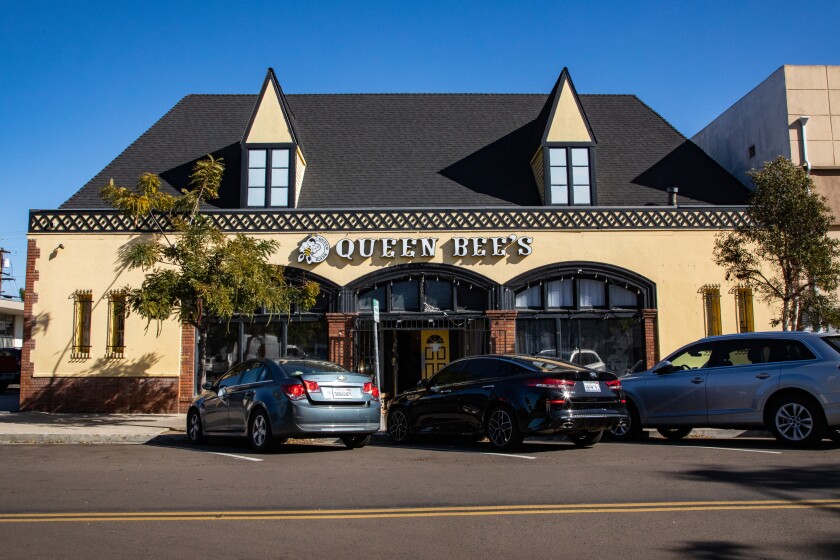
Queen Bee’s Arts & Cultural Center in North Park is battling to keep from going under.
(Jarrod Valliere / The San Diego Union-Tribune)
In this week’s edition of Arts in the Time of COVID, Pacific editor Nina Garin talks about Wynton Marsalis canceling his upcoming concerts, saving Queen Bee’s Art & Cultural Center and a special project by local musician Alfred Howard. Watch it here.








